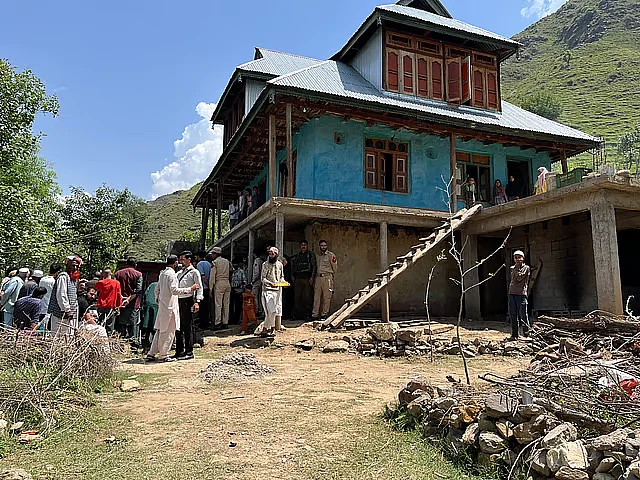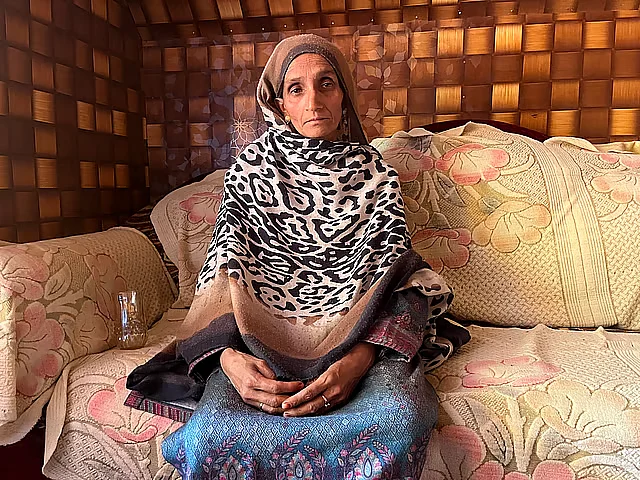
Around 7.10 pm on the night of May 7, Naseemat Akhtar tried calling her husband, Qari Mohammad Iqbal. The 40-year-old was worried. Cross-border shelling had intensified, and given that they lived in Poonch, a sensitive border region, she wanted to check on him.
Iqbal, 47, did not answer. Nearly an hour later, a relative called to say he had been killed by a Pakistani shell. It was the first night of intense Indo-Pak military escalation after Operation Sindoor, and Iqbal had been the first civilian casualty.
As if his death was not devastating enough, the very next day, one of the guests switched on the news on their mobile phone, and the grieving household was dealt another blow. “First we saw it on Zee News, and then on News18. They were showing my brother’s photo, and the anchors were shouting that India had killed a wanted terrorist,” said his brother, Qari Mohammad Farooq, 42.
Iqbal did not live in Pakistan-occupied Kashmir (PoK). He was not a terrorist. Neither was he killed by the Indian military.
He taught at the Zia-ul-Uloom Madrasa in Poonch city five days a week. He lived with his wife and children about 20 kilometres away, in a village called Mandi, just about a kilometre south of the Line of Control (LoC).
“The night he died, he was trying to rush the children to the basement to protect them from the shelling,” said Maulana Syeed Ahmed Habib, vice principal of the madrasa, where nearly 1,200 children from across the state study.
The same shell that killed Iqbal also injured three children, who are now recovering.
Despite their grief, Imtyaz Ahmed, 30, who is Iqbal’s nephew, said that given their proximity to the border, death is not entirely unexpected.
“We kept trying to console ourselves by saying that he has been martyred for the country, that he is closer to Allah now,” he said.
“But what we did not see coming was the wrath of the Indian media. That really broke us.”

Rubbing salt in the wound
The morning after Iqbal’s death, despite the tense situation, villagers began pouring in to offer condolences.
“He was a very respected religious leader in the area. Our family is also part of the panchayat of our village,” said Farooq, Iqbal’s brother.
News18 India and CNN-News18 ran multiple shows on the incident. Senior journalist Kishore Ajwani went on air and claimed that Iqbal – a “Lashkar commander” who ran “terror factories” in PoK – had been given the “death pill” by India.
On Zee News, they displayed a bloodied photo of Iqbal and excitedly told viewers that the “NIA’s most wanted” terrorist, who had been hiding out in PoK’s Kotli, was a commander of terror camps. “He brainwashed youths and prepared them for terror activities,” they announced, declaring it a victory for India’s Operation Sindoor.
CNN-News18 branded him a Lashkar-e-Taiba commander “India was searching for a very long time,” and claimed he had masterminded the 2019 Pulwama terror attack, which killed 40 Indian soldiers.
Hours later, News18 India issued an apology on its Hindi channel saying it had no intention of harming him or his family and called it a “human error”. As of May 14, the English channel CNN-News18 – which aired a panel discussion on Iqbal, led by senior anchor Rahul Shivshankar – has not issued an apology. One of the panelists claimed that Iqbal was “technically not a terrorist operation leader, but a “motivator and radicaliser” who brought children of a very young age into Jaish-e-Mohammed and Lashkar-e-Taiba. The headline of the YouTube clip uploaded by the channel referred to Iqbal as a “Lashkar terrorist”.
Neither Iqbal nor his family lived in PoK. When we met them in Poonch, they repeatedly emphasised that not a single one of them had ever been accused of anti-national activities, nor had any FIRs against them.
“Even when militancy was at its peak, we stood by our army,” said Farooq.
On May 8, as the news branding Iqbal as terrorist was picked up by multiple channels like CNN-News18, Zee News, Republic TV, ABP, and News18 India, the Poonch district police called out the “fake news” and issued a clarification, stating “he had no terror links”. They also stated that “legal action will follow against those spreading misinformation”.
Some channels pulled down the clip, while others, like CNN-News18, deleted or made private their videos on YouTube only by May 14 – six days after broadcasting the misinformation. ABP’s Marathi channel, with 15.3 million subscribers, has still not taken the video down, as of May 14.
“It was as if they rubbed salt in our wounds,” said Iqbal’s brother, still unable to believe what he saw on television.
“All they needed was his daadi aur topi (beard and cap) to brand him a terrorist. And what do these anchors, sitting in their AC studios in Delhi, even know about our lives on the border? What do they know about how much danger we face when two countries decide to fight? And instead of honouring his death, they went on TV and broke us,” he said.
Family appeals
Qari Iqbal had two wives and eight children. Naseemat, his first wife, stayed back in the village to look after their land and animals. They belong to the Gujjar community, classified as nomadic Scheduled Tribes in the region of Jammu and Kashmir. Iqbal had been one of the few people from their community who managed to complete his studies.
“He finished his Islamic education from a school in Gujarat and returned to Poonch in 2004. He had always wanted to be a teacher and be around kids,” said his nephew.
“He used to always tell me to come live with him in the city more often,” said Naseemat. “But I like the village life and never went with him.”
She is most worried about their eldest son, who is 18 years old and differently abled. “Who is going to take care of us now?”

The family wants to pursue legal action against the channels.
“We want these channels to shut. It is these channels that are the actual anti-nationals, the ones who feed the country with complete misinformation. They need to be punished for this.”
Imtyaz, Iqbal’s nephew, said that in their village of around 3,000 residents, Muslims, Hindus, and Sikhs live together. “We all go to each other’s funerals and weddings. But the TV channels have tried to turn this into a Hindu-Muslim issue now.”
On May 12, BJP’s national executive member Ravinder Raina, a former MLA in the state, visited the family. “The local media asked him what action would be taken but he didn’t really respond,” said Iqbal’s nephew.
Local reporters left to face anger
Newslaundry and TNM reached out to a senior anchor at one of the TV channels who had hosted a panel discussion amplifying the misinformation. He declined to be named, but said, “I had no idea about this. It was not my job to verify this. I am merely a talking head. If this is fake, the channel must issue an apology.”
A Network 18 spokesperson said that “at the network level, we’ve already apologised”. He was referring to the statement that called the news a “human error”.
Newslaundry and TNM also spoke to two Jammu and Kashmir-based reporters who work for the channels that branded Iqbal a terrorist. Both requested anonymity, fearing job loss. “But I do want to tell you what it does to our lives, because we live here, our families live here, and we face the brunt of this,” one of them said.
On the night of May 7, Rohit* was near the madrasa where Iqbal taught, when the shelling happened. “I knew Qari Iqbal saab well. I had gone to the hospital when he passed away,” said Rohit. “I even sent the news to my channel, but they didn’t use it.”
The next day, when his media organisation ran a false report about Iqbal, Rohit was shocked. “The group operates multiple channels. Though the news wasn't run by the channel I am associated with, I still called up my editor and told him the reality. They took it down, but it was already too late,” he said.
Similarly, Nikhil*, who also works with one of the channels that aired the misinformation, was covering the aftermath of the shelling when locals called to tell him what his channel was doing. “I got so angry. I immediately called my office and asked them why they hadn’t bothered checking with me. I am the one on the ground,” he said.
Both reporters said that when their studios in Delhi air such stories, it is they who end up facing local anger. Since then, they say, it has become difficult and frightening for them to report from the ground. “Our channels don’t understand it. I felt we would get beaten up. Everywhere I go, I have to explain to locals that I did not do this,” said Rohit.
Nikhil explained that there haven’t been communal issues in this region till now, “but such things bring that fear in”. “I belong to a Hindu community, and now I will be scared to go to a Muslim house. They will be angry with us, and rightly so.”
The frustration is palpable at Iqbal’s house.
“If we see any of these reporters from Zee or News18, we will beat them, chase them. Their channels have caused us so much pain,” said Imtyaz.
Nikhil, who has worked with his channel for many years, said some of his sources have lost faith in him. “Even the police called and asked me why I did this, and I had to explain that I did not.”
Newslaundry and TNM sent a detailed questionnaire to News18, Republic, and Zee News, seeking clarity on their news verification processes, the timing of when the clips were taken down, whether a public apology was issued, and if they had personally reached out to the family to apologise for the harm caused. This report will be updated if they respond.
Saeeduzzaman contributed to research for this report.
Update at 12.57 pm: Hours after this report was published, Newslaundry asked the Network 18 spokesperson about a News18 India video calling Iqbal a “terrorist” still available on YouTube. This copy will be updated if a response is received.
Newslaundry is a reader-supported, ad-free, independent news outlet based out of New Delhi. Support their journalism, here.







